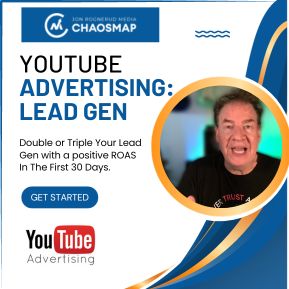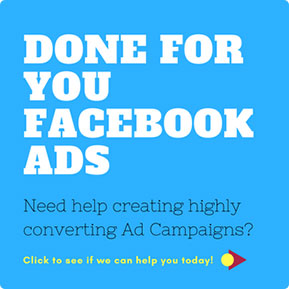Google Search. Quality Scores. Your (Business) Future?
How can you peer into, and predict a different (better) future state for your business lead flow by improving the simple, yet powerful Quality Score (QS) on the Google Ad networks?
It’s true. The impact of a positive, high number (1 through 10) Quality Score on your keywords association inside your ad groups in Google Adwords can heavily impact your business in either direction. (And, even your mind, if you worry too much about it…)
We’ll look at the important QS attribute (yes, it’s not a metric) in this post.
Why does Google have the Quality Score in the first place?
Google is rewarded for high relevancy of search – users are happy, advertisers are elated – when all is working perfectly. The incentives to make this work are all there – from more money made by Google corporation, to users who get what they want, and advertisers who get more leads and hopefully, more sales (conversions).
Google wants the revenue, the advertisers look at cost per acquisition and lead flow, and users look for information (“I’m looking for this topic – did I find it?”).
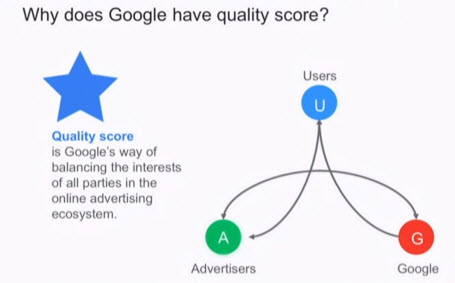
Figure 1 – Google Quality Score Ecosystem
QS is the system that makes all 3 parties happy.
But, the Quality Score algorithm has changed, and Google decided it was time to add to their platform – by using the power of the people. They wanted to learn how they could do this, and still make relevancy central.
The wisdom of the crowds became the rule.
Wisdom of the crowds = The process of taking into account the collective opinion of a group of individuals rather than a single expert to answer a question.
They knew that it would get the better answer than simply an algorithm. Users decide the outcome, and Google looks at what results gets clicks. From the research, analysis and tests it showed what probably was most interesting to them (users), and what was most relevant.
Here are some reasons why quality score is important, and what factors influences QS:
- Eligibility – is it eligible to enter the auction (bid) for that query
- Position – the relative position for your ad in relation to others ads on that result
- Ad Extensions – if you are ad is of high enough quality to show Ad Sitelinks
- Price – A better quality score reduces the price you need to bid to maintain a given position
- Top Slot – Only high quality ads are eligible to appear above the natural (SEO) search results
- DKI – Dynamic Keyword Insertion – Only ads with high enough QS Can use DKI
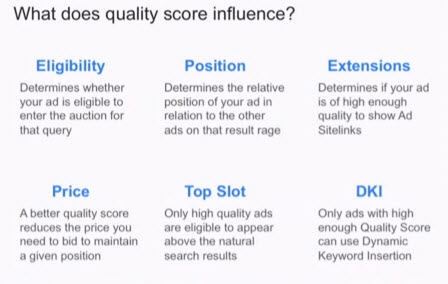
Figure 2 – Importance and influence of Quality Score
IMPORTANT: If two advertisers are bidding the same amount for a keyword, the QS (highest score) will win. The top ad on Google could actually pay less than than the number two position. That
means that advertiser has a highly relevant ad. This system works amazingly well.
RULE: Try to be in 1-3 position – because Ad extensions on the right side will have less screen real estate.
Also, if no ads meet the criteria for relevancy, organic results will be lifted higher, and no ads will be shown.
While keyword research is important, you must also consider emotional triggers and mindset. For example, ask this: “What are they thinking when typing the keyword?”
In summary – you will spend more money if your quality score is not good, and you’ll have an uphill battle while your competitors are paying less. And, moving a 3-4 QS upwards has a bigger impact in cost reducation versus moving in the higher ranges, for example 7-8. (It means you are already doing pretty good).
The introduction of Ad Extensions is now a quality indicator, and is becoming very important for Ad Ranking. It’s not about Bids and Quality Score alone.
Figure 3 – New Ad ranking formula
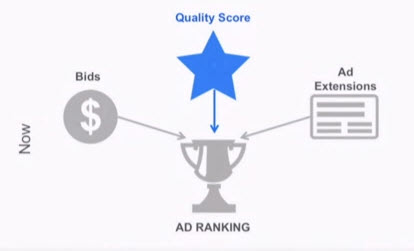
Google is a publisher, and wants to make as much money as possible. A CPM pricing model would be more helpful (more money) for Google, but nobody really likes that.
When Google perfected the CTR model – and you (advertiser) get a high CTR, Google wins – because they get more money as well.
How is QS calculated?
First, keep in mind – the different ad networks and devices will impact the numbers.
They are different on the various platforms:
- Search on Google
- Search on Google Partners
- Search on Mobile
- Search on Display
The 1-10 quality score is an approximation. Actual scores are unique for each query.
Figure 4 – Quality Score Relevancy Factors
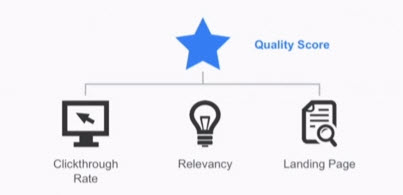
QS = The CTR is a huge factor, the Relevancy (a bit of mystery still) and the Landing Page
The CTR is weighed – and at different levels:
- Account
- Ad text
- Keyword level
Figure 5 – Quality Score Account Relevancy Detail
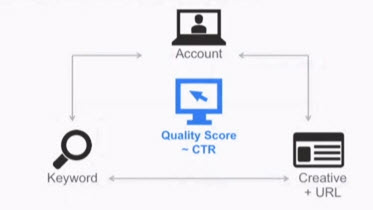
Are you starting a brand new Google Adwords account?
For a brand new account – and a new keyword…how does Google come up with a quality score for that?
Well, it’s likely others have advertised on it, and it’s the starting point.
Are you managing an existing Google Adwords account?
If you have an existing account, and you have performance already, you’ll have the existing history from the market (external factors). And, you likely already have some history,
so Google will give you a benefit / boost from your work, because you’ve done better than most.
What’s to be expected?
Once you get enough data between creatives and keywords, you’ll start to see the numbers. And, no campaign ID or ad group ID is used to determine quality score. It’s ok to restructure the account, just focus on the keywords, ads and relevancy. The Landing Page is important, but not as high for quality measurement as people think.
Exact match CTR is important, but QS only gets added when there’s a match between the searched keyword and the adgroup keyword.
Relevancy and location (geographic), time of day, time of week must also be tested and considered.
Is the landing page important for quality score?
The landing page is the smallest factor of the Quality Score. But you should ask: Is the information that the person was looking for? Look at analytics for user engagement, user information, etc?
Do they hit the “back” button immediately? Adding and tracking conversion rate, is more important – but landing page quality is a small component. You might have a keyword with a low quality score, but the landing page is converting really well. Google will not move the QS number just because you are converting well. Google doesn’t use that (conversions) as a criteria for Quality Score.
Are Ad Extensions used in the Quality Score formula?
They are not part of quality scores (probably should be). However, using them allows one advertiser over another to possibly win more from clicks, and it means more money for Google, and the user was given more options – all are happy.
You can see the QS value by modifying the column view inside Adwords, and you should take a look today.
How to determine landing page success and relevancy for users?
Connect Google Analytics To Adwords, and look at bounce rates to start. It will show you if landing pages are having an issue. Look at time on site and data that shows engagement (or not).
What are smart optimization tips for a high performance Adwords campaign?
- Tightly themed ad groups
- Multiple ad texts in each ad group
- Use all ad extensions that make sense for you (add a “review” link (testimonials))
- Make a compelling call to action in ad text
- Fix keywords with lots of impressions and low CTR
- Fix keywords with very few impressions and low CTR
- Set bids based on your business goals
- Use Search Query Reports to discover what users look for
If you have a top performance keyword, but low QS, move it into a new ad group, and work on it.
QS is a guiding attribute that can improve you ROI, but your business goals are the most important. Showcasing amazing adwords metrics don’t matter either, and your clients (most often) don’t care.
What are the best ways to organize Ad Groups?
Keywords:
- 5-30 closely related keywords
- Not using different match types for same keyword
Ads:
- 2 ad texts (A/B test)
- Use the keyword in ad text (DKI too)
- Deliver information, not gimmicks
- Always be testing the ad text!
Figure 6 – Adwords optimization strategies
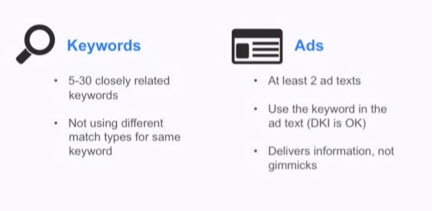
What are baseline rules for Adwords changes?
- At least 100 impressions to let QS settle in
- Bid enough to be in top positions to start (1-3 positions with ad extensions)
- Remove or optimize bad QS keywords
- Experiment and make changes you think will increase relevancy
IMPORTANT: Even if everything is “perfect”, QS will not be 100%.
Additional Rules To Consider:
Bidding to the top position will likely get you a higher quality score, gets Google data more quickly, and possibly easier to maintain the quality score.
How do one-word key phrases work in relation to quality scores?
For example, a word like “chiropractor” could mean different things (somebody might be looking for one, or wanting to become one). Google looks at the data system-wide. How have other performed on this keyword?Then, when you add in your own account information, and when Google sees yours, it starts building QS for it. If you are doing good, then you’ll benefit.
A QS attribute gets updated in real-time, but not at the same time. It could happen while you are reading this, or in a few hours, etc.
Call extensions are very valuable to consider, and must be tested. For example, it uses an 855 number, and if you are local business, you might consider changing
this to a local number. However, you will not be able to track the data inside Google, and you’ll lose that call tracking reporting there.
So, the quality score is very dependent on external factors, what users are doing, how well you are ranked on SEO, if they see your results over others, etc.
The wisdom of the crowds has the final say on this, and Google is helping that approach with software and tools.
And remember:
- QS is an attribute, not a metric
- QS is a real-time value – there is no history that you can see for it
- QS should not ruin your life – don’t lose sleep over it. Do your best. Your conversions are the most important after all.
If you understand how to take advantage of the Quality Score – your future can be a prosperous one!
The wisdom of the crowds always wins.
Jon Rognerud and Chaosmap work with Fortune 500 companies, associations and entrepreneurs to create digital traffic strategies that scale up members, customers, leads and sales with profitable returns. Mr. Rognerud wrote a best-selling book (Buy On Amazon), “The Ultimate Guide To Optimizing Your Website” (Entrepreneur). Connect directly here.


